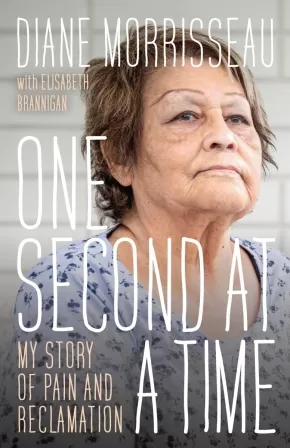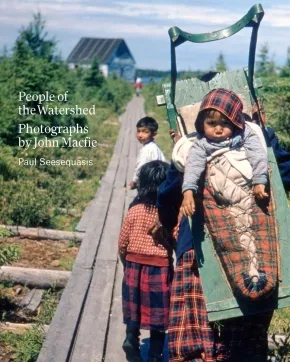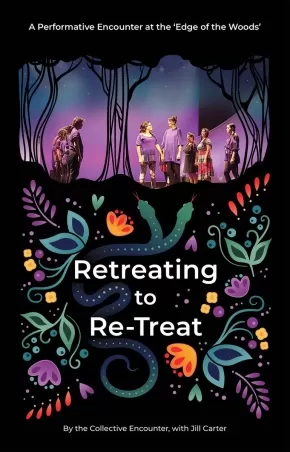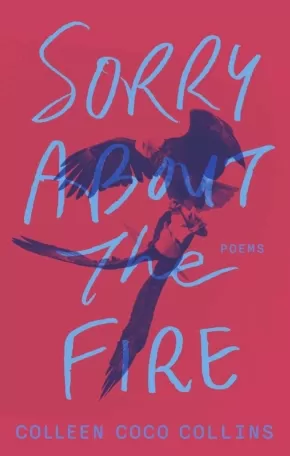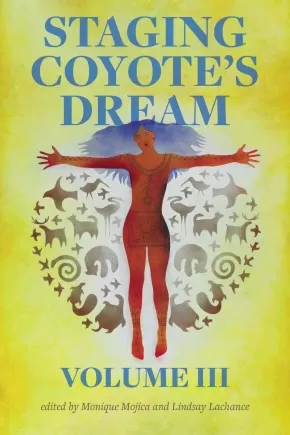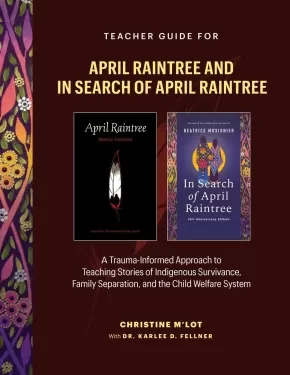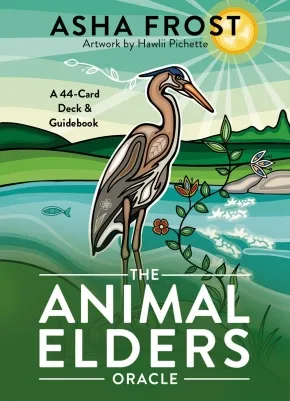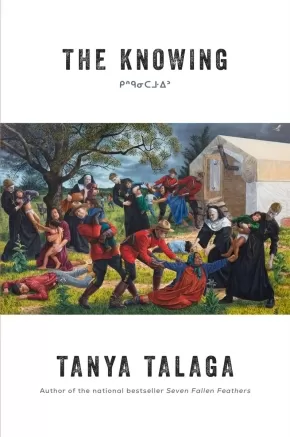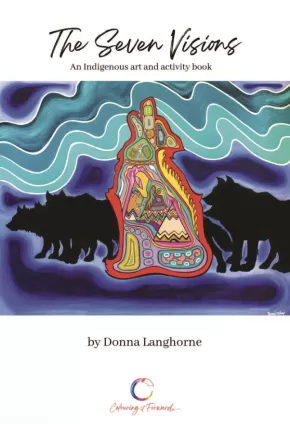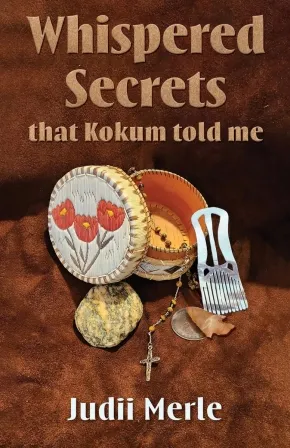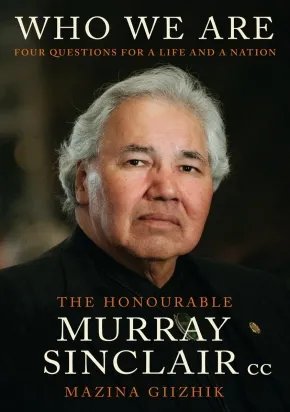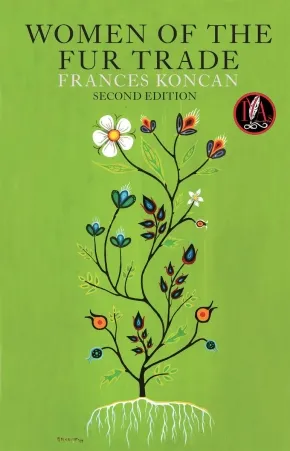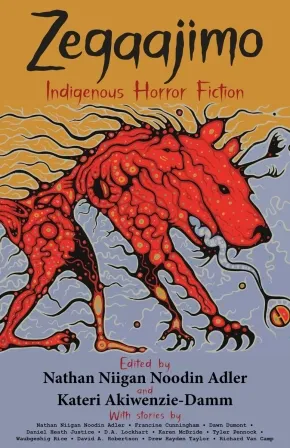
Anishinaabeg
46
-
60
of
200 Results;
Sort By
Go To
of 14
One Second at a Time: My Story of Pain and Reclamation
$24.95
Format:
Paperback
Text Content Territories:
Indigenous Canadian; First Nations; Anishinaabeg; Sagkeeng;
Reading Level: N/A
ISBN / Barcode: 9780774880978
Synopsis:
Synopsis:
Bullied and abused at the Fort Alexander Indian Residential day school, Diane Morrisseau fought back and left school at the age of fifteen. Despite her strength, a childhood of trauma and abuse led her into the arms of Edgar Olson, and by sixteen, the young Ojibway-Anishinabe woman had given birth to her first child and married the man who would become her tormentor for the next eighteen years.
For almost two decades, Diane Morrisseau was chained to a brutal husband who abused not only her, but their children. By threatening Diane with their death and hers should she ever try to leave, he ensured that she would continue to endure his cruelty. Notoriously violent, her abuser was aided and abetted by the systems of colonialism that failed to protect Diane during her childhood. Edgar was able to keep Diane and her children trapped in a cycle of violence for years, without being held accountable by law or society.
Despite this, Diane found the strength to walk away. This book is the story of how she did so, and how she rebuilt a life beyond her abuser. Through Al-Anon, Anishinabe traditional healing ceremonies, counselling, and care for others, Diane found a new path illuminated by compassion and purpose.
Diane Morrisseau recounts her traumatic history with one aim: to help other victims of violence know they are not alone, and that escape is possible. The author’s entire career, and this book, testify to her desire to extend to others the hope that eluded her in the depths of her desperate circumstances.
Devastatingly frank about the abuse she suffered, the mothering her children missed because of it, and the systems that allowed it all to happen, Diane today has reconciled the past with a present where she continues to live out the values that matter to her most.
All royalties from sales of this book will be donated to Archway Community Services.
The story of an Ojibway-Anishinabe woman who, against incredible odds, rescued herself and her children from a life of brutal beatings, sexual servitude, and almost unimaginable hardship.
Reviews
"Selected as one of the most anticipated feminist books of 2024."— Ms. Magazine
"A courageous and harrowing story. Morrisseau uses her painful personal journey to frame the horrific history of residential schools. Evocative and illuminating."
— Angela Sterritt, author of Unbroken: My Fight for Survival, Hope, and Justice for Indigenous Women and Girls
"I is, in many ways, a difficult story to read – but it is one that needs to be told. Readers will learn about a courageous woman and the circumstances that enabled an abusive relationship, and hear her message for how to recognize the situation and take steps toward a better life."— Don McCaskill, co-author of In the Words of the Elders
"A fervent call to action, an impassioned plea for compassion and empathy, and a formidable rallying cry that seeks to instigate transformation [… One Second at a Time] serves as a bridge, seeking to connect human souls through shared understanding and collective responsibility."— From the foreword by Marlyn Bennett
"Raw and brutally honest. Morrisseau bravely shares the details of her life with a violent man. Validating and inspiring, her story affirms the complicated healing journey of abuse survivors. It’s a must read for anyone working in the field of gender-based violence."— Kendra Nixon, director of Research and Education for Solutions to Violence and Abuse (RESOLVE)
"Diane Morrisseau has taken us into her confidence with her story, allowing us to truly understand as a society how the relationship between Indigenous people and settlers has created immense hardships for Indigenous people, families, and communities."— Marion Maar, professor, Northern Ontario School of Medicine University
Educator Information
All royalties from sales of this book will be donated to Archway Community Services.
Table of Contents
Foreword: A Tapestry of Truths / Marlyn Bennett
Preface
Prologue
A Note on the Text
1 A Perfect Home
2 Day School
3 Posting of the Bands
4 Mrs. Olson
5 Holes in the Walls
6 Breakdown
7 Scars
8 Breaking Free
9 Seeing the Trees
10 Freedom at Last
Acknowledgments
About the Authors
Additional Information
198 pages | 5.50" x 8.50" | Paperback
People of the Watershed: Photographs by John Macfie
$35.00
Artists:
Format:
Paperback
Text Content Territories:
Indigenous Canadian; First Nations; Anishinaabeg; Oji-Cree; Cree (Nehiyawak);
Reading Level: N/A
ISBN / Barcode: 9781773272603
Synopsis:
Synopsis:
"John Macfie's vivid and stirring photographs show a way of life on full display - the world my ancestors inhabited and that my mom fondly described to me. It is a world that, shortly after these pictures were taken, ended. So distant and yet achingly familiar, these pictures feel like a visit home."- Jesse Wente, Anishinaabe broadcaster, arts leader, and author of Unreconciled: Family, Truth, and Indigenous Resistance
While working as a trapline manager in Northern Ontario during the 1950s and 1960s, John Macfie, a Canadian of Scottish heritage, formed deep and lasting relationships with the people of the Indigenous communities in the region. As he travelled the vast expanse of the Hudson Bay watershed, from Sandy Lake to Fort Severn to Moose Lake and as far south as Mattagami, he photographed the daily lives of Anishinaabe, Cree, and Anisininew communities, bearing witness to their adaptability and resilience during a time of tremendous change.
Macfie's photos, curated both in this volume and for an accompanying exhibition by the nipisihkopawiyiniw (Willow Cree) writer and journalist Paul Seesequasis, document ways of life firmly rooted in the pleasures of the land and the changing seasons. People of the Watershed builds on Seesequasis's visual reclamation work with his online Indigenous Archival Photo Project and his previous book, Blanket Toss Under Midnight Sun, serving to centre the stories and lives of the people featured in these compelling archival images.
Reviews
"The images reflect a sensitive eye and respectful approach to a solid documentary project." - The Globe and Mail
"Shines a light on the overlooked histories of Indigenous communities in northern Ontario." - APTN
Additional Information
192 pages | 8.01" x 9.99" | 100 colour and black and white photos | Paperback
Retreating to Re-Treat: A Performative Encounter at the 'Edge of the Woods'
$21.95
Format:
Paperback
Text Content Territories:
Indigenous Canadian; First Nations; Anishinaabeg;
Reading Level: N/A
ISBN / Barcode: 9780369104649
Synopsis:
Synopsis:
In 2019, a group of scholar-artists led by Jill Carter stood with their audience in a liminal space at the 'edge of the woods'—a space between now and then, a space between now and later. Together, they engaged in a survivance intervention: an Indigenous reclamation of territory, using Storyweaving practices rooted in personal connections to the land as a method of restor(y)ing treaty relationships.
Retreating to Re-Treat documents both their artistic offering and creation process, offered in the spirit of knowledge-sharing and enriching scholarship around collaborative practices. By revealing their unique and still-developing method for addressing a fraught and tangled (hi)story, the Collective Encounter invites readers to join them as we mediate those sites of profound experiences and renewal—sites in which the project of conciliation might truly begin.
Additional Information
144 pages | 5.37" x 8.38" | Paperback
Sorry About the Fire
$19.95
Format:
Paperback
Text Content Territories:
Indigenous Canadian; First Nations; Anishinaabeg; Odawa (Ottawa);
Reading Level: N/A
ISBN / Barcode: 9781771966139
Synopsis:
Synopsis:
I wanted a good bewildering, / down deep, / as the keep of a castle.
With a voice as ungovernable and determined as Prometheus—who stole fire from Zeus only to face dire consequences—Colleen Coco Collins' debut poems are daring dispatches from beyond the margins: light-filled flares sent up from the edge of language, sentience, land, and story. Drawing on all of her multidisciplinary enamorations and rendered through the triple vision of her Irish, French, and Odawa heritage, Sorry About the Fire introduces not just a poet, but a stunningly original sensibility.
Reviews
"Fealty to the sentient. To every mostleast thing, to every impulse (sentient), gesture (sentient). Re-resourcing language to equip it to be fit: bawaajigan. telamon. mothaitheacht ... Collins' Sorry About the Fire is the story of a dark time, in which the strike of language on the texture of reality sounds a sharp off-note—and sparks; and/or the story of a light-drenched time in which a sensibility cracks open, beholding/becoming."—Luke Hathaway, author of The Affirmations
"Colleen Coco Collins employs vocabulary as a joyful precision tool, re-earthing the intimate relations between wonder, grief, and the more-than-human world. Embodying the playful and destructive energy of the cosmos, her poems vibrate like some kind of ancient, sacred rock & roll."—Shary Boyle
Additional Information
64 pages | 5.00" x 8.00" | Paperback
Staging Coyote's Dream Volume 3
$34.95
Format:
Paperback
Text Content Territories:
Indigenous American; Indigenous Canadian;
Reading Level: N/A
ISBN / Barcode: 9780369104748
Synopsis:
Synopsis:
On the twentieth anniversary of its first volume, Staging Coyote’s Dream Volume 3 is a curated collection of new works rooted in Indigenous values, aesthetics, and narrative structures. Inspired by their own dramaturgical practices and current conversations in contemporary theatre creation, co-editors Monique Mojica and Lindsay Lachance identify the invaluable and understudied ways that many Indigenous theatre artists are creating culturally specific dramaturgical processes and shifting the paradigm for what is considered “text.” By presenting models for relational theatre-making and land-based explorations outside the traditional “well-made-play” structure, Staging Coyote’s Dream Volume 3 is more than just a collection of plays; it offers some strategies and tools for how Indigenous artists can reimagine the structures of new-play development and performance on Turtle Island.
An anthology that identifies and highlights a vast array of anti-colonial performing arts processes, including reclamation, embodiment, and community-engaged work—to name only a few—Mojica and Lachance gather the works of artists leading these practices to not only honour how their plays are expanding dramaturgy, but to build Indigenous performance literacies for all practitioners creating on Turtle Island.
Additional Information
416 pages | 6.00" x 9.00" | Paperback
Teacher Guide for In Search of April Raintree and April Raintree: A Trauma-Informed Approach to Teaching Stories of Indigenous Survivance, Family Separation, and the Child Welfare System
$25.95
Format:
Coil Bound
Text Content Territories:
Indigenous Canadian; Métis;
ISBN / Barcode: 9781774920947
Synopsis:
Synopsis:
First published in 1983, In Search of April Raintree is a Canadian classic that presents a heart-rending and powerful account of the harsh realities that Indigenous and Métis peoples face.
Written by Anishinaabe educator Christine M’Lot with psychologist Dr. Karlee Fellner, the Teacher Guide for In Search of April Raintree and April Raintree helps teachers create dynamic learning experiences for their students in grades 11 and 12, while maintaining a respectful and dignified approach to Indigenous topics.
In this guide you will find:
- an inquiry based approach with resources for teaching from a trauma-informed stance
- easy-to-use lesson plans, reproducibles, and assessment opportunities
- a focus on wellness and supporting students while learning about difficult topics
- activities that encourage cross-curricular connections and collaboration
- free access to supplemental videos covering wellness topics
- a glossary of terms and suggested resources to extend learning
Educator Information
For use with students in grades 11 and 12.
This teacher guide can be used with either In Search of April Raintree or April Raintree, a version written specifically for teens in grades 9 to 12 that does not contain the graphic graphic scene in the original.
Additional Information
98 pages | 8.50" x 11.00" | Spiral Bound
The Animal Elders Oracle: A 44-Card Deck & Guidebook of Indigenous Wisdom & Healing Medicine
$25.99
Artists:
Text Content Territories:
Indigenous Canadian; First Nations; Anishinaabeg; Ojibway;
Reading Level: N/A
ISBN / Barcode: 9781401978181
Synopsis:
Synopsis:
Tap into guidance from the animal spirit realm and connect to ancestral wisdom with this transformative 44-card deck and guidebook from Indigenous Medicine Woman and author of You Are the Medicine and The Sacred Medicine Oracle, Asha Frost.
Everything is interconnected. All of creation carries a spirit. Indigenous people have always had a sacred relationship with animals and treated them as honored elders. Animal beings in the spirit realm are part of our spiritual support team as allies and medicine keepers, ready to help, waiting to remind you of your humanity and deep connection to the natural world.
With 44 Elder Animals depicted in a richly detailed traditional Ojibway art style, each card carries its own unique medicine. This deck offers meaningful insights and messages to guide you on your path both from the universe and in the voice of an animal spirit guide from the lands of the Ojibway people—from Elder Artic Hare to Elder Wolf. Whether you're seeking clarity, healing, or a deeper connection to your ancestral lineage, these cards provide a bridge to the spirit world.
Use this deck your rituals and ceremonies, do readings with it for your clients and friends, and share it with your communities. As the medicine ripples out, hold Indigenous people in your heart and honor how their history continues to impact your current reality.
Additional Information
128 pages | 3.50" x 5.00" | Card Deck & Guidebook
The Dialogues: The Song of Francis Pegahmagabow
$22.00
Format:
Paperback
Text Content Territories:
Indigenous Canadian; First Nations; Anishinaabeg; Ojibway; Wasauksing First Nation;
Reading Level: N/A
ISBN / Barcode: 9781989496916
Synopsis:
Synopsis:
In The Dialogues: The Song of Francis Pegahmagabow, award-winning author Armand Garnet Ruffo brings to life not only the story of the famed WWI Indigenous sniper, but also the complexities of telling Indigenous stories. From Manitoulin Island to the trenches of WWI to the stage, Ruffo moves seamlessly through time in these poems, taking the reader on a captivating journey through Pegahmagabow’s story and onto the creation of Sounding Thunder, the opera based on his life. Throughout, Ruffo uses the Ojibwe concept of two-eyed seeing, which combines the strengths of western and Indigenous ways of knowing, and invites the reader to do the same, particularly through the inclusion of the Anishinaabemowin language within the collection. These are poems that challenge western conventions of thinking, that celebrate hope and that show us a new way to see the world.
Additional Information
120 pages | 6.00" x 9.00" | Paperback
The Forgotten Frontier
$24.95
Artists:
Format:
Paperback
Text Content Territories:
Indigenous American; Native American; Apache;
Reading Level: N/A
ISBN / Barcode: 9781998779437
Synopsis:
Synopsis:
Ela Tahoe, a runaway turned deputy sheriff, is forced to contend with a Confederate invasion of her New Mexican town three months after the conclusion of the Civil War. Ela will need to confront her heritage and past with the Apache in order to get their aid to combat this Confederate threat, leading her to look at the world from the Native American perspective once again. Conceived as a tightly paced, gut wrenching western thriller, Ela fights tooth and nail to save the lives of her townspeople and most importantly, her son.
The American Western Frontier is arguably one of the most widely misrepresented histories, rife with inaccuracies and stereotypes. Black Mi'kmaq and Anishinaabe author Tristan Jones powerfully and critically reimagines and reclaims a historical retelling of the Frontier with a focus on the historically missing Indigenous narrative. Illustrated by master sequential artist Alexander Bumbulut, The Forgotten Frontier should be on everyone's reading list.
Additional Information
140 pages | 6.00" x 9.00" | Paperback
The Knowing
$39.99
Format:
Hardcover
Text Content Territories:
Indigenous Canadian; First Nations; Anishinaabeg; Ojibway; Inuit; Métis;
Reading Level: N/A
ISBN / Barcode: 9781443467506
Synopsis:
Synopsis:
From Tanya Talaga, the critically acclaimed and award-winning author of Seven Fallen Feathers, comes a riveting exploration of her family’s story and a retelling of the history of the country we now call Canada
For generations, Indigenous People have known that their family members disappeared, many of them after being sent to residential schools, “Indian hospitals” and asylums through a coordinated system designed to destroy who the First Nations, Métis and Inuit people are. This is one of Canada’s greatest open secrets, an unhealed wound that until recently lay hidden by shame and abandonment.
The Knowing is the unfolding of Canadian history unlike anything we have ever read before. Award-winning and bestselling Anishinaabe author Tanya Talaga retells the history of this country as only she can—through an Indigenous lens, beginning with the life of her great-great grandmother Annie Carpenter and her family as they experienced decades of government- and Church-sanctioned enfranchisement and genocide.
Deeply personal and meticulously researched, The Knowing is a seminal unravelling of the centuries-long oppression of Indigenous People that continues to reverberate in these communities today.
Additional Information
480 pages | 6.12" x 9.25" | Hardcover
The Seven Visions - Indigenous Art & Activity Book (8 in stock, in reprint)
$16.18
Artists:
Format:
Paperback
Text Content Territories:
Indigenous Canadian; First Nations; Anishinaabeg;
Reading Level: N/A
ISBN / Barcode: 24-DF-082-1
Synopsis:
Synopsis:
This art book features artwork by Anishinaabe artist Donna Langhorne.
In the Seven Visions, Anishinaabe artist Donna Langhorne describes to you the meaning behind her seven pieces of artwork. Her visions were inspired by the seven sacred teachings, and draw on contemporary issues affecting Indigenous people.
Diana Frost from Colouring It Forward adds suggestions of activities that you can engage in to do something about these issues and to participate in reconciliation.
Additional Information
8.5"x11", 24 pages, full colour book
Whispered Secrets That Kokum Told Me
$23.95
Format:
Paperback
Text Content Territories:
Indigenous Canadian;
Reading Level: N/A
ISBN / Barcode: 9781990326424
Synopsis:
Synopsis:
In the ages and eons before settlers descended upon Turtle Island, Indigenous people made their homes here, among the trees, rivers, lakes and mountains. Babies were born; people died during famine and war; families roamed from one gathering place to another, always in search of food that would help them survive another winter. Four-leggeds, fliers, swimmers and crawlers provided meat; the standing people, bushes and plants took care of the rest. The water, cold and clear, was available to everyone. Mother Earth supplied everything needed to sustain the inhabitants, and Creator of All watched over their comings and goings. Life was hard, but joy also abounded.
Although a work of fiction, this might have been the story of my family . . . or yours.
Additional Information
248 pages | 5.50" x 8.50" | Paperback
Who We Are: Four Questions For a Life and a Nation (HC) (2 in Stock)
$39.95
Format:
Hardcover
Text Content Territories:
Indigenous Canadian; First Nations; Anishinaabeg; Ojibway;
Reading Level: N/A
ISBN / Barcode: 9780771099106
Synopsis:
Synopsis:
Judge, senator, and activist. Father, grandfather, and friend. This is Murray Sinclair’s story—and the story of a nation—in his own words, an oral history that forgoes the trappings of the traditional written memoir to center Indigenous ways of knowledge and storytelling. As Canada moves forward into the future of reconciliation, one of its greatest leaders guides us to ask the most important and difficult question we can ask of ourselves: Who are we?
For decades, Senator Sinclair has fearlessly educated Canadians about the painful truths of our history. He was the first Indigenous judge in Manitoba, and only the second Indigenous judge in Canadian history. He was the Chair of the Truth and Reconciliation Commission, and remains one of the foremost voices on Reconciliation. And now, for the first time, he will share his full story—and his full vision for our nation—with readers across Canada.
Drawing on Senator Sinclair’s unique experiences, and his perspectives regarding Indigenous identity, human rights, and justice in Canada, Who We Are will examine the roles of history, resistance, and resilience in the pursuit of finding that path forward, and healing the damaged relationship between Indigenous Peoples and non-Indigenous peoples in Canada. And in doing so, it will reveal Senator Sinclair’s life in a new and direct way, exploring how all of these experiences shaped him as an Anishinaabe man, father, and grandfather.
Structured around the four questions that have long shaped Senator Sinclair’s thinking and worldview—Where do I come from? Where am I going? Why am I here? Who am I?—Who We Are will take readers into the story of his remarkable life as never before, while challenging them to embrace an inclusive vision for our shared future.
Additional Information
480 pages | 6.00" x 9.00" | Hardcover
Women of the Fur Trade - 2nd Edition
$19.95
Format:
Paperback
Text Content Territories:
Indigenous Canadian; Métis; First Nations; Anishinaabeg; Ojibway;
Reading Level: N/A
ISBN / Barcode: 9780369105158
Synopsis:
Synopsis:
In eighteen hundred and something something, somewhere upon the banks of a Reddish River in Treaty One Territory, three very different women with a preference for twenty-first century slang sit in a fort sharing their views on life, love, and the hot nerd Louis Riel.
Marie-Angelique, a Metis Taurus, is determined to woo Louis (a Metis Libra)—who will be arriving soon—by sending him boldly flirtatious letters. Eugenia, an Ojibwe Sagittarius, brings news of rebellion back to the fort after trading, but isn’t impressed by Louis’s true mediocre nature. And Cecilia, a pregnant British Virgo, is anxiously waiting on her husband’s return from an expedition, but can’t resist pining over the heartthrob Thomas Scott (Irish Capricorn), who is actually the one secretly responding to Marie-Angelique’s letters. This will all go smoothly, right?
This lively historical satire of survival and cultural inheritance shifts perspectives from the male gaze onto women’s power in the past and present through the lens of the rapidly changing world of the Canadian fur trade.
Awards
- 2023 Indigenous Voices Award for Published Prose in English
- 2018 Toronto Fringe Best New Play Contest winner
- 2024 Dora Mavor Moore Award for Outstanding New Play
Reviews
“Not only is the play a fun and clever look at the province’s history, but by weaving in modern slang and references, Koncan (who is of Anishinaabe and Slovene descent) highlights how many Indigenous issues from our past are still relevant today.” — Stephanie Cram, CBC News
“A timely, provocative piece of theatre written from a perspective and voice we need to hear.”— Ian Ross, Winnipeg Free Press
Additional Information
120 pages | 5.32" x 8.35" | 2nd Edition | Paperback
Zegaajimo: Indigenous Horror Fiction
$28.00
Format:
Paperback
Text Content Territories:
Indigenous Canadian;
Reading Level: N/A
ISBN / Barcode: 9781928120445
Synopsis:
Synopsis:
A brand-new, spine-chilling collection of horror/thriller fiction, Zegaajimo, Anishinaabemowin for "to tell a scary story," includes stories from eleven leading First Nations and Metis authors from across the territories of Canada: Nathan Niigan Noodin Adler, Dawn Dumont, Daniel Heath Justice, D.A. Lockhart, Karen McBride, Tyler Pennock, Waubgeshig Rice, David A. Robertson, Drew Hayden Taylor, and Richard Van Camp.
Many of the stories draw on Traditional Stories. These stories of supernatural settings and deadful dees are more than speculative fiction, they are also reminders that monsters are already in our midst, that the known can be just as frightening as the unknown, and that the slightest mistakes can have dire consequences.
The collection is co-edited by Nathan Niigan Noodin Adler and Kateri Akiwenzie-Damm. Thrilling horror, Indigenous-style, perfect for Halloween!
Additional Information
230 pages | 5.50" x 8.50" | Paperback
Sort By
Go To
of 14

